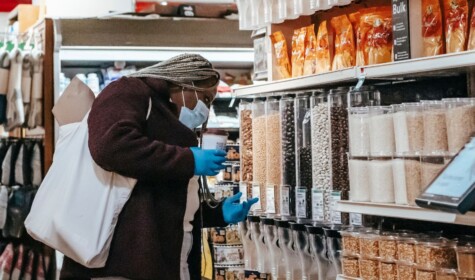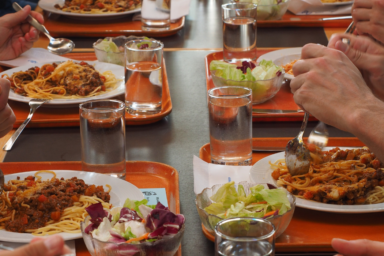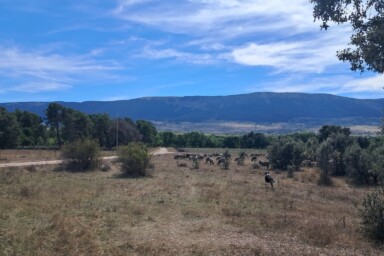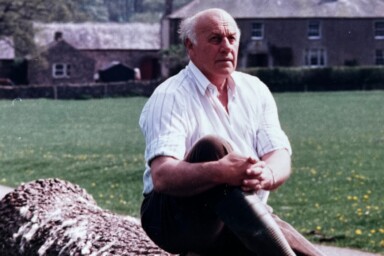It’s easy to miss Food Co-op BCN when walking past. In Barcelona’s affluent Eixample district, home to a high concentration of psychedelic Gaudí buildings and glassy boutique facades, only those who know to look will catch the bumblebee-coloured sign tucked away down a quiet side alley. Beyond the threshold, lies a brand-new supermarket. There are gleaming dry goods dispensers, crates full of fruit and vegetables, and beautifully stacked shelves. A few shoppers wander the aisles, stopping frequently to chat with each other.
A community run supermarket
“In the supermarket I used to shop in, I would get my things and not speak with anyone,” says customer and co-op member Cristina Gil Gomez. “Here, it’s a totally different experience. It’s like coming into a family.” Everyone knows everyone, and for a simple reason: they all work together.
“We work three hours every four weeks on tasks for the supermarket,” explains Cristina. The supermarket, which opened its doors in February, employs no paid staff at all. The usual supermarket chores are divided up amongst the 518 members of the co-operative.
This model is different from a usual cooperative business. In simple terms, a co-operative is a business owned and democratically controlled by its members. The profits of the business are directed to the common good of the membership. The members are those closest to the business: usually either workers, producers or customers. Food Co-op BCN is a novel iteration of the co-operative economy, however. It elides the distinction between a consumer co-operative and a worker co-operative: as customers, members buy into the business with a €90 investment; but they are also active participants in the daily running of the supermarket, from unloading deliveries to stacking shelves to working the till.
Co-operative supermarkets around the world
The Barcelona shop is not alone in experimenting with the co-operative model in this way. It is part of a blossoming of participative and co-operative supermarkets across Europe. In recent years, independent initiatives have been established in Brussels and Liege; Paris, Montpellier and Bordeaux; Madrid, Valencia and across Catalonia. The longest standing supermarket in Europe is La Louve in Paris, which opened in 2016 and has so far demonstrated that such initiatives can be financially viable. But for all these projects, it’s an American beacon which has provided the blueprint: the Park Slope Food Co-op in Brooklyn, which has been running on participative cooperative principles since it opened in 1973 as a way of pooling communal resources to get affordable food.
“We had basically no money,” says Joe Holtz, who helped open Park Slope back then. “We received deliveries on Thursday and Friday and sold the food on Saturday. We wrote checks on Thursday and Friday that we didn’t have enough money in the bank to cover, and then we made a deposit on Saturday night.” For five years, members were initiated based on ‘sweat equity’ – their commitment to help in the work of the co-operative – and no initial joining investment. It was only in 1978, when the coop signed its first lease for a ground floor retail space, that they began to ask for a $10 equity investment into the business. A couple of years later, Park Slope Food Co-op bought the building, later expanding into a second space, and it has managed to keep its hold in Brooklyn even as the demographic of the neighbourhood has changed radically over the years.
In its punkish, ad hoc way, the Park Slope Food Co-op created a novel form of the co-operative economy – riffing on an organisational model that has deep roots stretching back to 18th century Scottish weavers and 19th century English cotton mill workers.
The Park Slope Food Co-op was also born in a particular historical moment. In mid-1970s New York, the city government nearly declared bankruptcy and there was an inflated moral panic over ‘Fear City’ as a place of high crime rates, blackout riots and general lawlessness. It was in this context that the new co-operative found its informal beginnings. These days, the financial barriers to setting up a new supermarket are stark. “Could you secure a lease in New York City today? It would be tight,” says Holtz. The conditions would need to be right. It would probably take years of patient planning and momentum building to gather a few thousand people across a neighbourhood willing to make a small initial investment, as well as the backing of a progressive financial institution.
For Tom Boothe, an American in Paris and one of the founders of La Louve, the story is one of personal perseverance and institutional benevolence. The early development of the supermarket began in 2010, and it finally opened its doors in 2016. “We had two very big, helpful friends,” he explains. “One is the city of Paris [the local government], who got us access to our space.” The co-operative leases 1500 square metres of commercial space in the 18th arrondissement, thanks to a social landlords scheme which the local government oversees. The second is the not-for-profit financial institution France Active, which invests in small businesses and social enterprises.
Boothe sees the social democratic values of France’s political and social life as key to securing early funding for the project. “We got about a million euros in loans,” explains Boothe. “In the States that’s not such an easy thing to do.” In France, he thinks things are different. “The idea of a co-operative supermarket that’s not there simply to make money for the people who own it, that’s extremely normal to people.”
The democratic principles of co-operativism run throughout the organisation: everything is decided by the co-op members, from organisational matters to the products on shelves. Both Park Slope and La Louve strive to serve the needs of their membership in a way that is inclusive and egalitarian. If they can source it, La Louve will stock any product a member requests. “We sell conventional products, we sell everything you can find in a regular supermarket, but we sell a lot of organic products and luxury products too,” explains Boothe. But, he adds, “we’ve never had a request for Coca Cola.”
At Park Slope, where membership has peaked at around 17,000 members, the ethos is the same. For many products, such as carrots and lemons, both conventional and organic versions are sold. But it only makes sense to stock what customers want to buy. “We let members vote with their dollars,” explains Holtz. It was many, many years ago that conventional collard greens came off the shelves when customers stopped buying them. “The organic collards were just a better product,” says Holtz.
Food co-op BCN has taken a different approach: members democratically voted for a series of principles that guide the selection of products. Wherever possible, products are organic, local and offer producers a just price, explains Cristina. But given the barriers to certification for would-be organic producers, these principles have been flexible. “We have evolved over time to register the fact that the aspiration to have everything organic isn’t viable,” she adds. In that case, the products tend to fulfil the other requirements, coming from would-be local organic farms. “We can visit their farms, and the producers themselves come with their trucks to the supermarket,” explains Cristina.
Boothe disagrees wholeheartedly with this prescriptive approach, though. “That is not at all our philosophy,” he says. “If you wait for a product to be ethically perfect, your supermarket will never exist because the world is in a terrible state.” More importantly, it’s an issue of inclusivity. “It’s fine to say to people who are making good money that you have to pay the ‘real price’ for food, but you cannot say that to people who are making 600 euros a month,” he explains. For La Louve, 8% of members receive benefits, meaning they earn less than a thousand euros a month, and another 2% are students living on grants. In a world where people aren’t paid a true living wage, there is a very real tension between the ambition to promote the best food and farming practices and the accessibility of affordable food through the co-operative economy. “You can either start a club or a co-operative,” says Boothe. A participative food business with such prohibitively high product standards and prices would be more ecological club than egalitarian co-operative.
The difference between co-operative supermarkets and Community Supported Agriculture
It’s important to understand, moreover, the distinctions between co-operative supermarkets and Community Supported Agriculture. The CSA model can’t be extrapolated to a large, multi-purpose food store, Boothe suggests. He is sceptical of supermarkets working directly with delivery from lots of small producers. “That’s the least ecological choice in terms of logistics,” because it multiplies the number of truck journeys drastically. “Economically, those projects won’t work,” he suggests, advocating working with distributors instead.
Both La Louve and Park Slope know what it means to come up against extreme financial difficulty. The great financial strength of this model is also an Achilles’ heel: member participation means there are fewer labour costs, massively reducing one of the most significant supermarket overheads. During the pandemic, that apparent advantage quickly became a major liability. No longer able to ask members to come in for shifts, Park Slope hired 130 extra staff while La Louve hired five and relied on ‘spontaneous co-operation’ from members coming in and stacking the odd shelf while they shopped. Another weakness of these co operatives is that they tend to draw from a much wider geographical circle than conventional supermarkets. During lockdowns, that meant some of the members living farther away came less often or not at all. Despite these challenges, La Louve and Park Slope have endured and continue to be vibrant centres of community and sustenance for their membership.
These co-operatives demonstrate that there is nothing inherent in the concept of a supermarket – a single shop where a person purchases all their food supplies and household necessities – to make it a cold, soulless, monolith. On the contrary, supermarkets could be a rich social resource – “the public libraries of food” as Boothe puts it – that offer affordable and accessible food to all, and act as practical centres of learning about the food system.
Are co-operative supermarkets the future?
In these precarious times, it might be hard to see a future for supermarkets in which participative co-operatives have any major role to play. Venture capital has placed its bets on ‘dark stores’ and the gig economy as the future of groceries: Gorillas and Getir motorbikes patrol big cities from dawn till darkest night, steered by zero hours workers who carry groceries from ghostly, customer-free supermarkets to the front doors of those that can afford it.
In the UK, the economic and energy crises of the time can make the prospect of a bold new project like a supermarket for the communal good feel remote, if not impossible. It is worth remembering, however, that the Park Slope Food Co-op emerged in one of the bleaker moments in New York City’s recent history. Answering the needs of its community, it was a practical effort in imagining a different, more egalitarian future, through collective action. The cost-of-living crisis presents a gloomy, difficult winter for many in the UK. But it’s precisely moments like these when necessity can drive imaginative approaches to co-operation and food provision, sparking new ways of organising in the service of the public good.







